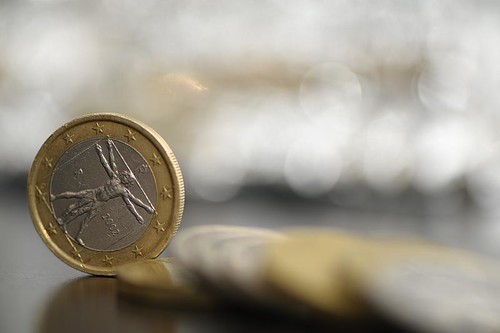Germany’s Role in the European Sovereign Debt Crisis
With Greece wracked by protests over impending austerity measures, Euro zone finance ministers have responded by approving yet another set of bailout funds for the Mediterranean country. A potential Greek default seems to have been staved off for now. Although financial markets have ticked upwards, there are still doubts over whether the EU can respond collectively to come up with a permanent solution to ward off another potential financial calamity. It is clear that more needs to be done. It is also clear that France and Germany cannot agree on what measures need to be taken.
French and German agreement on a plan of action is crucial to solving the sovereign debt crisis in Europe. Both nations were the motors for the process of European integration and both are key decision makers in solving this crisis. However, French President Nicholas Sarkozy and German Chancellor Angela Merkel fundamentally disagree on how to prevent Greek default and how to prevent subsequent financial contagion that will spread not only to the rest of the PIIGS, Portugal, Italy, Ireland, Greece and Spain, but most likely to the entire Euro zone and the global economic community. This potential chain of events would further harm an already tepid economic recovery after the global financial crisis.
Sarkozy supports more aggressive measures than Merkel. He wants Europe to collaborate on recapitalizing banks, ideally by turning the European Financial Stability Facility, the official name for Europe’s bailout fund, into a bank. The European Financial Stability Facility, EFSF, could then draw on loans from the European Central Bank, which has the authority to print Euros as needed; such a measure would be a Europe-wide approach. It would also depend on the European Central Bank abandoning its tight monetary policy and continuing to inject cash into banks that are dangerously exposed to government bonds at risk of default across the Euro-Zone. France is also more reluctant than Germany to restructure Greek debt by forcing private bondholders to take on more losses. Sarkozy fears that it might lead investors to dump bonds from the PIIGS, triggering a financial crisis as well as hurting its triple AAA credit rating, since French banks hold more Greek debt.
Merkel, on the other hand, is not as keen on more interventionist measures by part of European institutions. She wants countries to be responsible for recapitalizing their own banks, only resorting to the European Financial Stability Facility as a last resort for recapitalization. This is driven mostly by domestic politics in Germany; where the public is largely opposed to Germany paying large amounts in rescue funds to its financially beleaguered partners in the Euro zone. Germany is currently the largest financial contributor to the rescue fund and will likely end up paying more if the rescue fund takes on the role of recapitalizing banks.
From a researcher’s perspective, and judging by the reaction from financial markets when Merkel and Sarkozy dropped the Eurobond as an option, it seems that a more proactive and interventionist approach from the European Central Bank is necessary to prevent an economic catastrophe in the Euro zone. Germany also needs to take on a more leading role, serving as the lender of last resort or at least removing its opposition to European institutions taking on more responsibility. Its own economic future is tied to how well the PIIGS manage their financial turmoil. Laggard economies in the Mediterranean will only worsen Germany’s outlook, as these countries will further lose their ability to serve as markets for German exports. But due to institutional constraints in the European Union, as well in domestic ones in Germany, it is unclear if this will ever happen. It seems likely that the next European summit will only produce a temporary solution. Europe is in dire need of a permanent solution and Germany, along with cooperation from France, must lead the way.
[Photo courtesy of sharaff]

